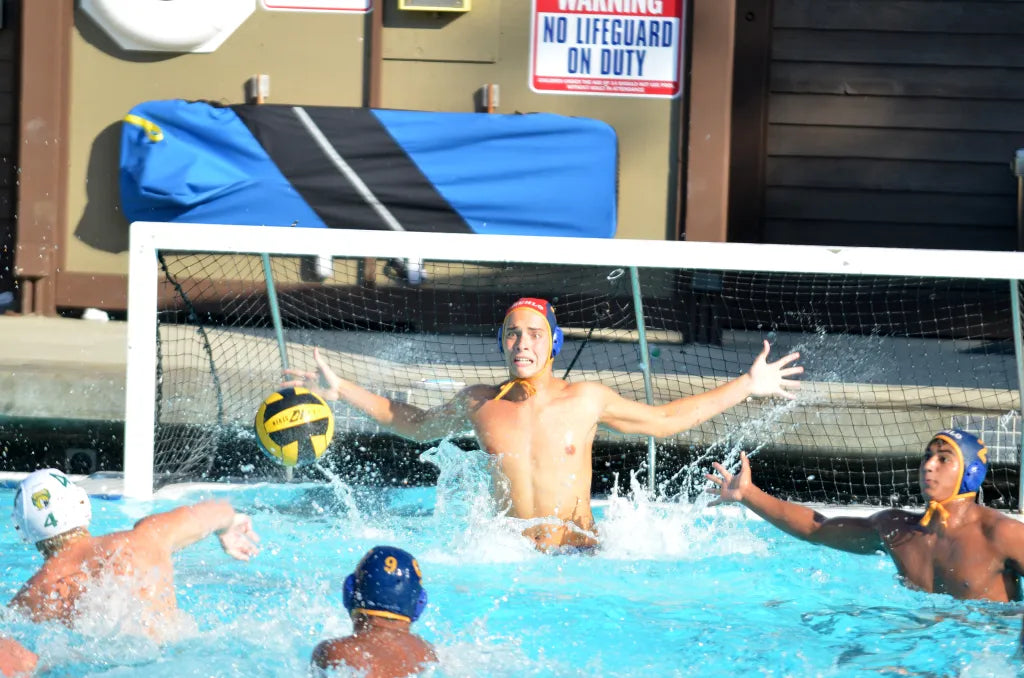Your Cart is Empty

To Swim or Not to Swim? That is the Question for Goalies in the Off Season
December 27, 2023 3 min read 1 Comment
From Guest Author, Jack Bowen
The annual "Most Asked January Question By Goalies": Is it actually helpful for goalies to swim in the off-season? The answer is, yes. Not imperative, but definitely helpful. In the same way ice hockey goalies need to be the most agile on their skates, water polo goalies need to be the most "fluid" in the water. Not only that, but the swim team experience gives you a break from water polo and a chance to do something different.
And there are other direct pay-offs:
-By focusing on breast stroke, you can improve your egg-beater kick: the power-stroke used in the goalie’s shot blocking move;
-There's enough down-time during a swim workout to include some active, focused stretching thus increasing your eggbeater range-of-motion;
-You maintain even greater efficiency in your aquatics-based movements;
-You can build a solid cardio-base to capitalize on as you start your water polo training in the beginning of the summer.
Some swim coaches will allow you a portion of the training time to egg-beater kick during kick sets (with a kickboard). And to maintain your fundamentals focus, you can stay in the water for just 10 minutes after workouts and work on 'Estep', lunges, and lob moves without the ball, and hopefully get in the goal once per week on weekends. If you do choose to participate in your school's swim season, these are things you should discuss with the coach ahead of time.
All that being said, some goalies use this time instead as "down time" from a sport team: Instead of swimming 5-6 days per week, they instead join a water polo club and play water polo 2-3 times per week and lift weights 3 times per week. Given that swim speed is not imperative for the goalie, this decision is certainly justifiable and may provide more benefits for some goalies en lieu of the swim team option.
For me personally, my sophomore year in high school I decided I wanted to really focus on water polo. So I quit lacrosse (my #2 sport) and swam that spring instead. While one of the slowest swimmers on the team, I improved immensely, had a pretty good time (as many of my water polo teammates swam), and certainly improved as a goalkeeper because of it.
My new approach to answering this question is this: What would I instruct my own child to do? In this case, I'd highly recommend they try the swim team option freshman year as just another chance to push themselves in a new way, be a part of a different team, and compete for your school. From there, if they weren't in love with it, I'd suggest they use the spring to focus intently on fundamentals and technique in the goal, improve their timing by seeing a lot of shots, and try to get into the weight room a few times a week as well. Or, if they had another sport they wanted to play for their high school team as a freshman, this is a great time to try that out.
The real hope here being that goalies make an informed decision and then truly own it moving forward. As with many things in life, this is just one more opportunity to examine priorities. This all provides a great time to reflect on what you want to focus on during the months preceding the Summer Season and, more so, to make an informed decision about your training, your education, and your priorities moving forward.
By, Jack Bowen
Menlo School Water Polo Coach, Author, & Head of Bowen Goalie Combines
Twitter & Instagram: @1jackbowen
Websites:
Water Polo & Goalie Training: https://www.sopenwaterpoloclub.com
Books & Writing: https://onlysky.media/jack-bowen/
1 Response
Leave a comment
Comments will be approved before showing up.

Signup for our newsletter
Be the first to get new products, training videos, and updates.


Bradley Schumacher
December 29, 2023
Jack,
Love this approach to High School swimming for Goalies. My only suggestion is that field players take the same general approach; I would add the following caveat for both goalies and field players. While I agree it has a benefit to their main sport of water polo, I would not like to see a 2-3 month period where they are not still playing club water polo and competing in both during swim season.
My recommendation is for the athlete(s) to approach the High School Swim Coach and ask for an exception to gain credit for workouts they are doing with club water polo so they can have a balance of training for both swimming and water polo. For example: Monday/Wednesday/Friday they go to swim training and Tuesday/Thursday/Sunday they go too club water polo. Most coaches do this with elite level club swimmers already and would be open to have solid water polo athletes supporting the swim program. The key here is that the athlete(s) stick to their commitment and are a positive part of the swim team. There will be some juggling on swim meet days where you will double up training based on the swim schedule. Our experience has been positive when the coaches and athletes have open communication around expectations and the team understands the water polo athletes on the team want to support the team in a positive manner, but they do need to continue toward their ultimate goal of playing water polo at their next level.
In closing, the approach for any elite level athlete is as Jack said above: “This all provides a great time to reflect on what you want to focus on during the months preceding the Summer Season and, more so, to make an informed decision about your training, your education, and your priorities moving forward.” It is extremely important as an elite level athlete to understand your goals on all fronts and make the appropriate decisions to take steps toward achieving the goals.
By, Bradley Schumacher
Two-Time Olympic Swimming Gold Medalist
Olympian Water Polo
KAP7 International
Founder and President
www.KAP7.com